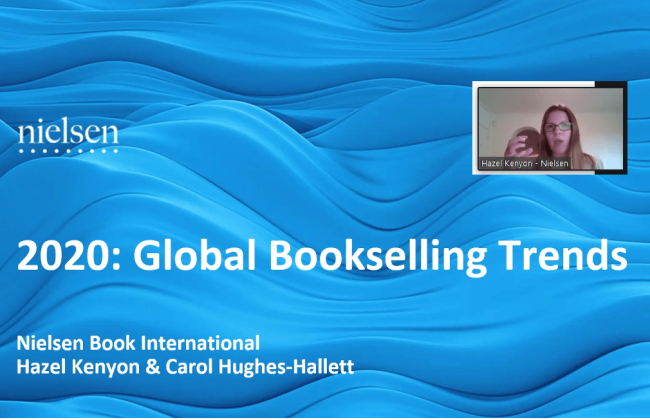
On Thursday, 29 April, we hosted a webinar to discuss the bookselling trends from the past year
Behind us is an unprecedented year that completely turned our lives around. The COVID-19 pandemic impacted our lives in many ways, from completely stopping our social gatherings and closing the doors of many businesses for weeks on end, to facilitating a big swing to digital services. Many booksellers stepped up their game in 2020 – be it by boldly launching new digital stores, entering social media channels to connect with their customers, or even by innovatively picking up delivery services with a bike or a sleigh. As the pandemic continues, we're taking a look back to see what we can learn from the previous year.

We welcomed Carol Hughes-Hallett and Hazel Kenyon from Nielsen Book International, who presented the overview of the international book markets in 2020, highlighted the top title and genre trends, and dove into the digital transitions during the COVID-19 pandemic in the UK.
"Books were essential in 2020"
During their presentation, Carol and Hazel highlighted some interesting patterns and issues that emerged in bookselling industry over the course of the past 12 months. Among them is a crucial insight that for many customers, supporting local and independent bookshops became a top priority in 2020. Discover more of top level findings below:
Global bookselling trends:
• Data presented includes stats and figures from across 10 countries: Australia, Brazil, India, Ireland, Italy, Mexico, New Zealand, South Africa, Spain, and the UK.
• For many countries, year on year sales numbers were down in 2020, compared to 2019
• Despite having multiple retail closures, the bookselling market in Ireland and the UK grew in volume sales (by 7% and 5% respectively)
Insights for upcoming year:
• Important to consider: many countries are entering recessionary conditions following COVID-19 (high unemployment, lower levels of consumer confidence, and lower economic outlook predictions) which will impact consumer spending
• Retailers can continue to maximise their appeal in a world where consumers take a very different approach to retail and online shopping
• A larger portion of consumer spending will shift from grocery to out of home spend in sectors that have suffered, such as bars, restaurants, and travel.
How booksellers can prepare:
• Adapt to lower foot traffic and revamping stores accordingly, focusing on lower density locations
• Deliver positive and successful user experiences to win online and offline
• Stores may have needed to reduce stock due to supply chain pressures

Digital channels:
• In the UK, e-books and audiobooks gained 4% of the UK market
• Audiobooks had their highest year yet in 2020
• By November, e-book sales had already surpassed full year 2019.
• We saw older consumers shift to digital, with people aged between 35 and 54 becoming more likely to buy their print books online (jump of 10% compared to previous year)
Missed the event?
Please note that the full recording of the event is accessible to EIBF members here. If you would like to listen to the recording, please get in touch with Jasmina Kanuric from our communications team.
